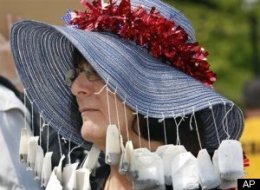 I was, and I remain, a big fan of the major theme of John Edwards’ presidential campaigns. I agree completely with Brent Budowski’s recent blog post at thehill.com referring to Edwards’ observation of “Two Americas” being “brilliantly right” – today more than ever. It’s also impossible to deny Budowski’s observation that events have proved Edwards to be “morally revolting.”
I was, and I remain, a big fan of the major theme of John Edwards’ presidential campaigns. I agree completely with Brent Budowski’s recent blog post at thehill.com referring to Edwards’ observation of “Two Americas” being “brilliantly right” – today more than ever. It’s also impossible to deny Budowski’s observation that events have proved Edwards to be “morally revolting.”
I have my own different reason for agreeing with Budowski’s observation that Edwards is “legally innocent.” Here is an excerpt from the trial judge’s instructions to the Edwards jury:
- The government does not have to prove that the sole or only purpose of the money was to influence the election. People rarely act with a single purpose in mind. On the other hand, if the donor would have made the gift or payment notwithstanding the election, it does not become a contribution merely because the gift or payment might have some impact on the election. Nor does it become a contribution just because the donor knew it might have some influence on the election and found that acceptable, if the donor’s real purpose was personal or otherwise unrelated to the election. In other words, the government has to prove that Ms. Mellon had a real purpose or an intended purpose to influence an election. in making the gift or payment. If her real purpose was personal or otherwise not for the purpose of influencing the election, or if you cannot say what the purpose was beyond a reasonable doubt, then that would not be sufficient to satisfy this element. If you find beyond a reasonable doubt that one of her purposes was to influence an election, then that would be sufficient.
So – the government’s case hinges on intent. Not the intent of the accused, John Edwards. No, the government’s case hinges on the intent of Mrs. Rachel “Bunny” Mellon, the 101-year-old heir to part of the Mellon banking fortune. Mrs. Mellon was not called to testify at the trial but Alexander Forger, her lawyer (and what a name for a lawyer!), gave testimony (hearsay?) that Mrs. Mellon did NOT intend campaign contributions:
- “She liked him as an individual, as a person. It wasn’t because he was running for president,If he wanted to be president of Duke University, she would have supported that….”
- “Is there any doubt in your conversation with her that you said this could not be a campaign contribution?” defense lawyer Abbe Lowell asked. “No doubt,” Forger replied. “Is there any doubt she said it was not a campaign contribution?” Lowell asked. “No doubt,” Forger again replied.
How could any sane jury find Edwards guilty of these charges? How could the jury divine beyond a reasonable doubt the intent of someone who was not called to testify?
And how could any sane prosecutor bring charges against someone based on the presumed intent of a 101-year-old woman – not the intent of the defendant?







